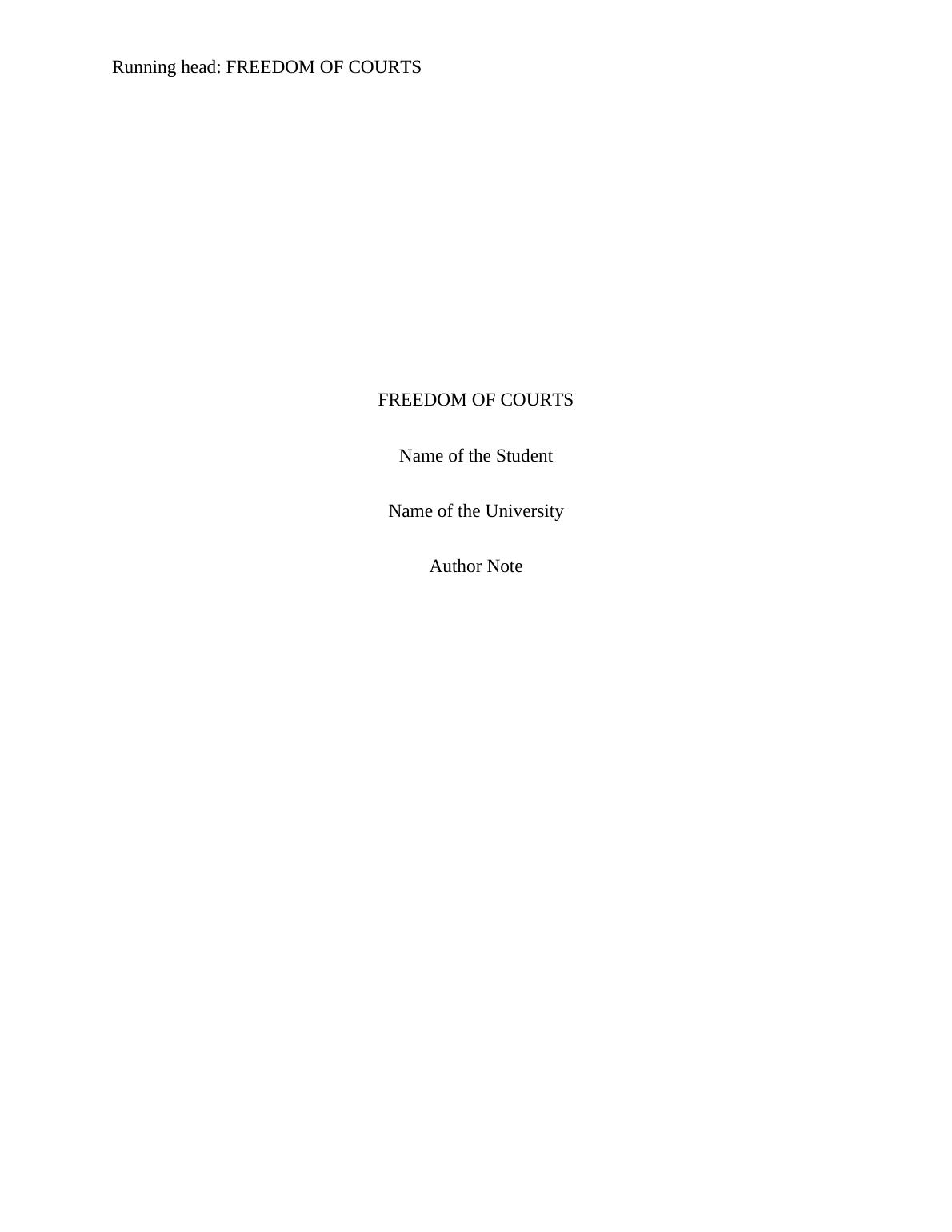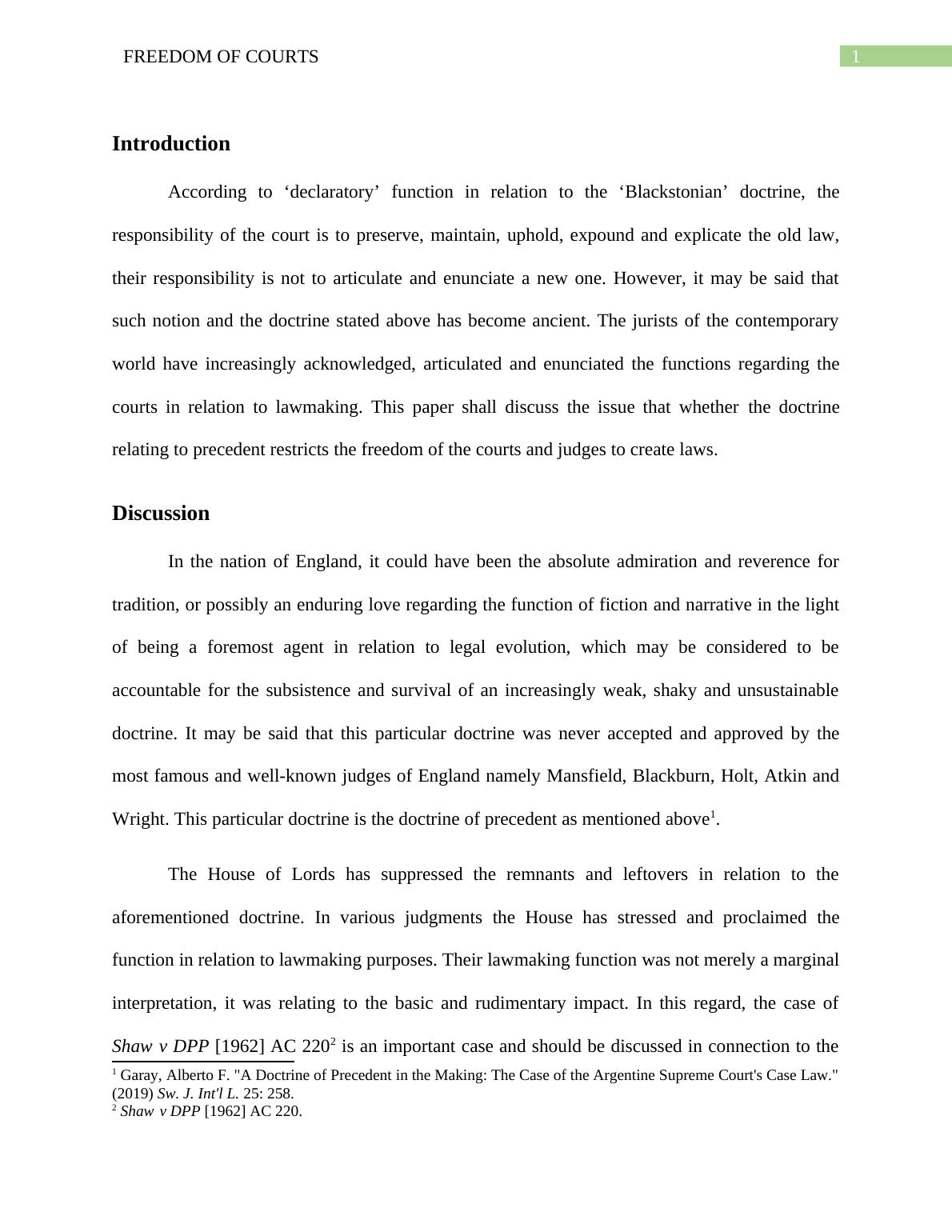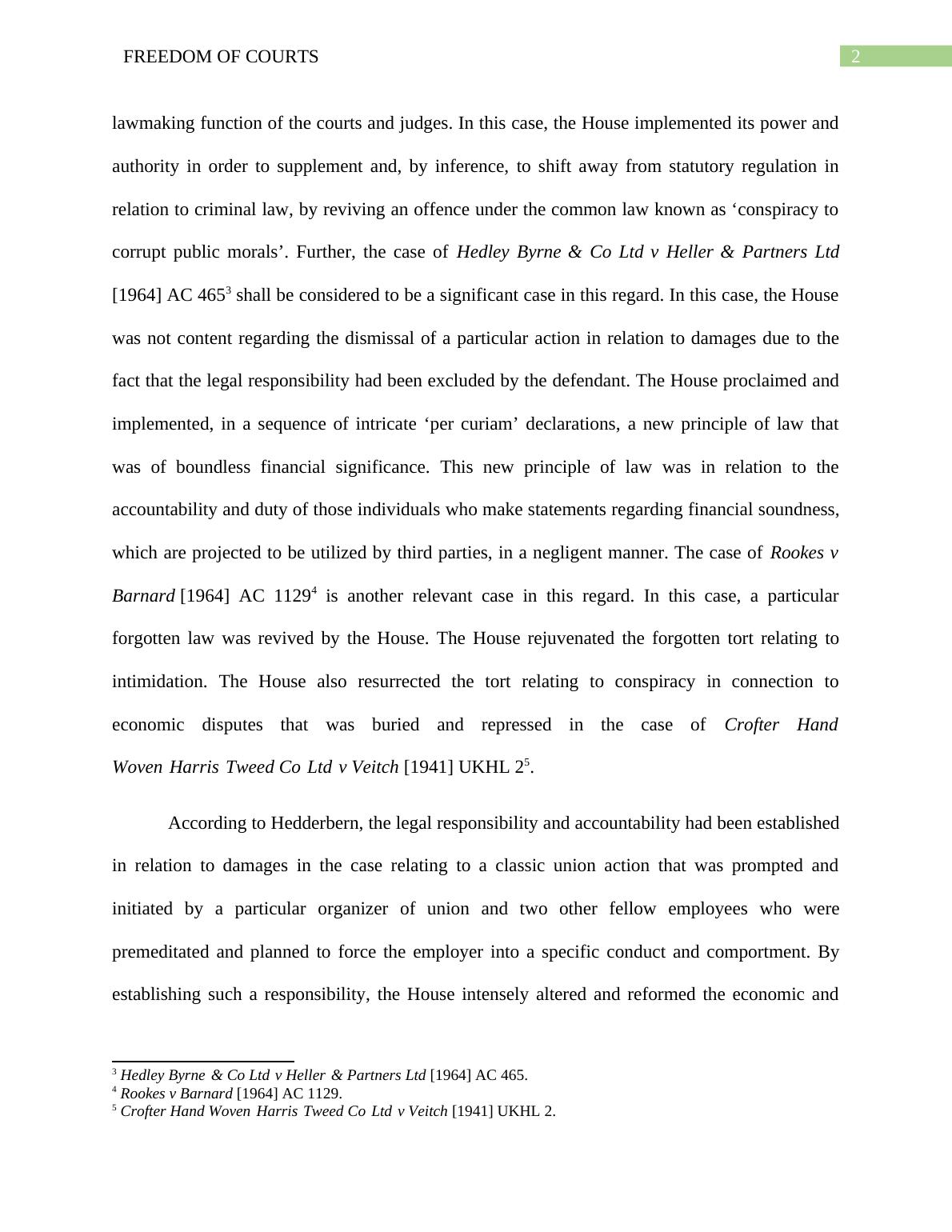Freedom of Expression and the Function of Courts -
Added on 2022-09-09
6 Pages1286 Words13 Views
Running head: FREEDOM OF COURTS
FREEDOM OF COURTS
Name of the Student
Name of the University
Author Note
FREEDOM OF COURTS
Name of the Student
Name of the University
Author Note

FREEDOM OF COURTS1
Introduction
According to ‘declaratory’ function in relation to the ‘Blackstonian’ doctrine, the
responsibility of the court is to preserve, maintain, uphold, expound and explicate the old law,
their responsibility is not to articulate and enunciate a new one. However, it may be said that
such notion and the doctrine stated above has become ancient. The jurists of the contemporary
world have increasingly acknowledged, articulated and enunciated the functions regarding the
courts in relation to lawmaking. This paper shall discuss the issue that whether the doctrine
relating to precedent restricts the freedom of the courts and judges to create laws.
Discussion
In the nation of England, it could have been the absolute admiration and reverence for
tradition, or possibly an enduring love regarding the function of fiction and narrative in the light
of being a foremost agent in relation to legal evolution, which may be considered to be
accountable for the subsistence and survival of an increasingly weak, shaky and unsustainable
doctrine. It may be said that this particular doctrine was never accepted and approved by the
most famous and well-known judges of England namely Mansfield, Blackburn, Holt, Atkin and
Wright. This particular doctrine is the doctrine of precedent as mentioned above1.
The House of Lords has suppressed the remnants and leftovers in relation to the
aforementioned doctrine. In various judgments the House has stressed and proclaimed the
function in relation to lawmaking purposes. Their lawmaking function was not merely a marginal
interpretation, it was relating to the basic and rudimentary impact. In this regard, the case of
Shaw v DPP [1962] AC 2202 is an important case and should be discussed in connection to the
1 Garay, Alberto F. "A Doctrine of Precedent in the Making: The Case of the Argentine Supreme Court's Case Law."
(2019) Sw. J. Int'l L. 25: 258.
2 Shaw v DPP [1962] AC 220.
Introduction
According to ‘declaratory’ function in relation to the ‘Blackstonian’ doctrine, the
responsibility of the court is to preserve, maintain, uphold, expound and explicate the old law,
their responsibility is not to articulate and enunciate a new one. However, it may be said that
such notion and the doctrine stated above has become ancient. The jurists of the contemporary
world have increasingly acknowledged, articulated and enunciated the functions regarding the
courts in relation to lawmaking. This paper shall discuss the issue that whether the doctrine
relating to precedent restricts the freedom of the courts and judges to create laws.
Discussion
In the nation of England, it could have been the absolute admiration and reverence for
tradition, or possibly an enduring love regarding the function of fiction and narrative in the light
of being a foremost agent in relation to legal evolution, which may be considered to be
accountable for the subsistence and survival of an increasingly weak, shaky and unsustainable
doctrine. It may be said that this particular doctrine was never accepted and approved by the
most famous and well-known judges of England namely Mansfield, Blackburn, Holt, Atkin and
Wright. This particular doctrine is the doctrine of precedent as mentioned above1.
The House of Lords has suppressed the remnants and leftovers in relation to the
aforementioned doctrine. In various judgments the House has stressed and proclaimed the
function in relation to lawmaking purposes. Their lawmaking function was not merely a marginal
interpretation, it was relating to the basic and rudimentary impact. In this regard, the case of
Shaw v DPP [1962] AC 2202 is an important case and should be discussed in connection to the
1 Garay, Alberto F. "A Doctrine of Precedent in the Making: The Case of the Argentine Supreme Court's Case Law."
(2019) Sw. J. Int'l L. 25: 258.
2 Shaw v DPP [1962] AC 220.

FREEDOM OF COURTS2
lawmaking function of the courts and judges. In this case, the House implemented its power and
authority in order to supplement and, by inference, to shift away from statutory regulation in
relation to criminal law, by reviving an offence under the common law known as ‘conspiracy to
corrupt public morals’. Further, the case of Hedley Byrne & Co Ltd v Heller & Partners Ltd
[1964] AC 4653 shall be considered to be a significant case in this regard. In this case, the House
was not content regarding the dismissal of a particular action in relation to damages due to the
fact that the legal responsibility had been excluded by the defendant. The House proclaimed and
implemented, in a sequence of intricate ‘per curiam’ declarations, a new principle of law that
was of boundless financial significance. This new principle of law was in relation to the
accountability and duty of those individuals who make statements regarding financial soundness,
which are projected to be utilized by third parties, in a negligent manner. The case of Rookes v
Barnard [1964] AC 11294 is another relevant case in this regard. In this case, a particular
forgotten law was revived by the House. The House rejuvenated the forgotten tort relating to
intimidation. The House also resurrected the tort relating to conspiracy in connection to
economic disputes that was buried and repressed in the case of Crofter Hand
Woven Harris Tweed Co Ltd v Veitch [1941] UKHL 25.
According to Hedderbern, the legal responsibility and accountability had been established
in relation to damages in the case relating to a classic union action that was prompted and
initiated by a particular organizer of union and two other fellow employees who were
premeditated and planned to force the employer into a specific conduct and comportment. By
establishing such a responsibility, the House intensely altered and reformed the economic and
3 Hedley Byrne & Co Ltd v Heller & Partners Ltd [1964] AC 465.
4 Rookes v Barnard [1964] AC 1129.
5 Crofter Hand Woven Harris Tweed Co Ltd v Veitch [1941] UKHL 2.
lawmaking function of the courts and judges. In this case, the House implemented its power and
authority in order to supplement and, by inference, to shift away from statutory regulation in
relation to criminal law, by reviving an offence under the common law known as ‘conspiracy to
corrupt public morals’. Further, the case of Hedley Byrne & Co Ltd v Heller & Partners Ltd
[1964] AC 4653 shall be considered to be a significant case in this regard. In this case, the House
was not content regarding the dismissal of a particular action in relation to damages due to the
fact that the legal responsibility had been excluded by the defendant. The House proclaimed and
implemented, in a sequence of intricate ‘per curiam’ declarations, a new principle of law that
was of boundless financial significance. This new principle of law was in relation to the
accountability and duty of those individuals who make statements regarding financial soundness,
which are projected to be utilized by third parties, in a negligent manner. The case of Rookes v
Barnard [1964] AC 11294 is another relevant case in this regard. In this case, a particular
forgotten law was revived by the House. The House rejuvenated the forgotten tort relating to
intimidation. The House also resurrected the tort relating to conspiracy in connection to
economic disputes that was buried and repressed in the case of Crofter Hand
Woven Harris Tweed Co Ltd v Veitch [1941] UKHL 25.
According to Hedderbern, the legal responsibility and accountability had been established
in relation to damages in the case relating to a classic union action that was prompted and
initiated by a particular organizer of union and two other fellow employees who were
premeditated and planned to force the employer into a specific conduct and comportment. By
establishing such a responsibility, the House intensely altered and reformed the economic and
3 Hedley Byrne & Co Ltd v Heller & Partners Ltd [1964] AC 465.
4 Rookes v Barnard [1964] AC 1129.
5 Crofter Hand Woven Harris Tweed Co Ltd v Veitch [1941] UKHL 2.

End of preview
Want to access all the pages? Upload your documents or become a member.
Related Documents
Constitutional Law | Assignmentlg...
|11
|3078
|9
English Legal System Business Law - Essaylg...
|14
|4092
|27